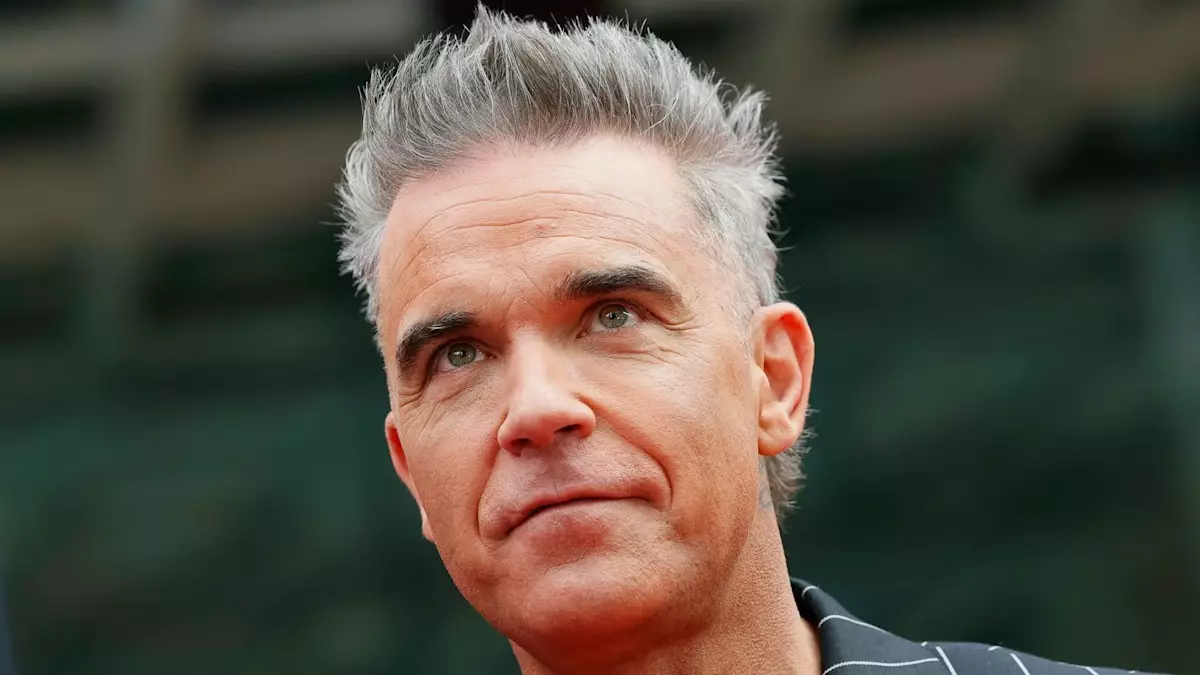Robbie Williams, the iconic figure best known for his work as a member of the boy band Take That, recently shared a powerful reflection on his experiences of “boy band dysphoria” through an emotional post on Instagram. This confession comes amidst the backdrop of the new documentary series, “Boybands Forever,” in which he participates alongside his former bandmates and rivals. The series delves into the trials and tribulations faced by boy bands like Take That, Westlife, and Five, shedding light on the often unseen pressures that come with fame.
In his lengthy statement, Williams revealed the harrowing effects of fame on mental well-being. He discussed his personal battles with addiction, contextualized within the overarching theme of the boy band experience—a phenomenon often romanticized but rarely understood. His candidness about his struggles, and those of his former bandmates, represents a significant moment in dialogue surrounding mental health and the darker side of celebrity culture.
Williams took the opportunity to directly address comments made by his former manager, Nigel Martin-Smith, who made claims about the nature of Robbie’s addiction. With an empowering tone, Williams asserted, “My drug taking was never your fault,” indicative of a desire to reclaim his narrative. He acknowledges that the intense pressures of the music industry can spiral into harmful behaviors. His words serve not only as a personal testament but also as a broader commentary on the boy band phenomenon that often leads to destructive coping mechanisms.
He brought attention to the grim pattern that emerges among boy band members—some manage to find their footing and heal, while others remain ensnared in the wreckage of their experiences. This insight reveals not only the psychological toll of their careers but emphasizes the need for understanding and support within the industry. By highlighting the struggles of his bandmates—such as Mark Owen’s alcoholism and Gary Barlow’s battle with an eating disorder—Williams creates an empathetic picture of the human cost of fame.
As the conversation continued, Williams pointed out the insidious nature of gaslighting, a term he used to describe the dismissal of his lived experiences. He emphasized how denial of one’s struggles can be deeply damaging, stating, “In modern parlance, to deny someone’s lived experience is called gaslighting.” This introspection reveals the complexity and intricacies behind addiction and mental health, often misunderstood by those not directly affected.
Through his struggles, Williams also shares an important message: the onus does not solely rest on the individual facing addiction, but also on those surrounding them who may be unaware of the severity of the situation. His rebuttal to Nigel’s claim suggests a widespread ignorance regarding the reality of addiction—an issue that permeates not only the music industry but society at large.
Despite the tumultuous road, Williams has achieved a remarkable milestone in his life. His 2023 Netflix documentary unveiled his journey through recovery, which saw him entering rehab in 2007 and temporarily separating from his wife, Ayda Field, in pursuit of sobriety. This narrative arc of struggle and redemption resonates with many, as it highlights the importance of prioritizing mental health over external expectations.
Rekindling his relationship with Ayda and establishing a family together—raising four children—adds a layer of hope to his story. It illustrates the possibility of healing that can arise from confronting one’s demons. Thus, Williams stands as a beacon for many who grapple with similar challenges, conveying that kinship, love, and understanding can serve as catalysts for recovery.
Robbie Williams’s candid revelations about his experiences of “boy band dysphoria” and addiction are crucial in normalizing discussions around mental health, especially in the often-unforgiving light of the music industry. His experiences encapsulate not just the personal ramifications of fame but also the collective struggles faced by those who find themselves in similar positions.
Through sharing his truth, Williams encourages vulnerability—a powerful antidote to the isolation often felt by those battling with mental health issues. As society begins to embrace such openness, the hope is that future generations of performers will feel empowered to confront their challenges, ultimately leading to a healthier dialogue around mental wellness in the realms of fame and success.
